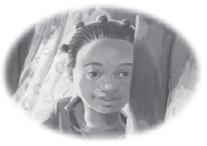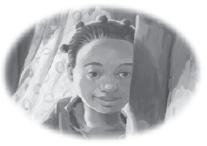The Paper House



The Paper House
L
OIS
P
ETERSON
ORCA BOOK PUBLISHERS
Text copyright © 2012 Lois Peterson
All rights reserved. No part of this publication may be reproduced or transmitted in any form or by any means, electronic or mechanical, including photocopying, recording or by any information storage and retrieval system now known or to be invented, without permission in writing from the publisher.
Library and Archives Canada Cataloguing in Publication
Peterson, Lois J., 1952-
The paper house [electronic resource] / Lois Peterson.
(Orca young readers)
Electronic monograph.
Issued also in print format.
ISBN
978-1-4598-0052-6 (
PDF
).--
ISBN
978-1-4598-0053-3 (
EPUB
)
I. Title. II. Series: Orca young readers (Online)
PS
8631.
E
832
P
36 2012Â Â Â Â Â Â Â Â Â Â
JC
813'.6Â Â Â Â Â Â Â Â Â Â
C
2011-907768-
X
First published in the United States, 2012
Library of Congress Control Number:
2011943725
Summary:
A mural on a tin shack brings hope and happiness to a girl in the slums of Nairobi.

Orca Book Publishers is dedicated to preserving the environment and has printed this book
on paper certified by the Forest Stewardship Council.
®
Orca Book Publishers gratefully acknowledges the support for its publishing programs provided by the following agencies: the Government of Canada through the Canada Book Fund and the Canada Council for the Arts, and the Province of British Columbia through the BC Arts Council and the Book Publishing Tax Credit.
Cover artwork by Scott Plumbe
| ORCA BOOK PUBLISHERS Â Â Â Â Â Â | ORCA BOOK PUBLISHERS |
| PO B OX 5626, Stn. B | PO B OX 468 |
| Victoria, BC Canada | Custer, WA USA |
| V 8 R 6 S 4 | 98240-0468 |
www.orcabook.com
Printed and bound in Canada.
15  14  13  12  â¢Â  4  3  2  1
For Shelley and Mohammed,
and their nephews Harrison and Isaiah.
Contents
A few facts about life in an African slum

Safiyah stood ankle-deep in garbage near the top of the dump. Below her lay the Kibera slum, a patchwork of rusty tin roofs. A thick blanket of cloud and dirty smoke hid the concrete buildings and busy roads of nearby Nairobi.
Not far from where Safiyah stood, a pack of small boys tussled like mangy dogs over a heap of old clothes. Suddenly, one broke away and leaped at her. “What have you got there?” he yelled.
She held the old magazines high in the air where he couldn't reach them. “You can't have them.”
The other boys were watching.
“Let me see.” With each jump, the boy's hands came a little closer. “Hey, you lot!” he yelled. “See what she's got.”
“It's just paper.” Safiyah could hear her voice shaking. She had seen gangs of boys corner lone girls before. Sometimes they beat them up or stole things from them. But the boy's friends had already found something more interesting in the garbage.
When she hid the handful of magazines behind her back, the boy leaped at her again. “Let me see the pictures.”
Safiyah sold most of the stuff she found at the dump. It was the only way to make money for a pound of maize or some tea. Sometimes a breadfruit for Cucu, her grandmother, who loved them so much.
People would buy almost anything she dug up: old clothes, cracked dishes, tins and old tires. Once Safiyah found an old clock that still worked, and they had eaten well for a week.
Today she was looking for paper to fill the cracks in the wood and metal walls of their house. Maybe Cucu would get well if Safiyah could keep out the smoke and the cold night air. Then Cucu could take care of the house and make the meals so that Safiyah could go to school like her best friend, Pendo.
But for that you needed more money than Safiyah could make selling stuff from the dump.
“I want to see,” screeched the little boy as he grabbed at her again.
Safiyah slipped and slithered away from his grasping hands. She waded through plastic cartons and torn packaging. Bottles and jagged cans tumbled down all around her. Clumps of plastic bags squelched under her feet. Ripped newspaper and stinky diapers clung to her legs.
Another landslide of smelly garbage fell around the little boy as he scrambled down behind her. “Let me see.” He yanked her arm.
Safiyah twisted away. But the boy squeezed his thin arms around her waist. He was hurting her, but she wasn't going to cry.
“It's just old magazines.” She held the papers out of reach.
“I want to look at the cars,” whined the boy. “There are always pictures of cars.”
“I need them.” As Safiyah pulled away, she almost fell back onto the garbage. Dense swarms of flies rose into the air. The sickly stench was worse now.
She was getting used to filthy puddles of water everywhere and the smell of burning garbage and rotten food. But the stink was always worse at the garbage dump.
The boy lunged at her again. He pulled one of her pigtails.
She slapped him.
He yanked her so hard that they both fell back into the shifting garbage. Something sharp poked Safiyah's back. A wad of slimy stuff clung to her leg.
The smell got worse as Safiyah and the little boy tussled.
Suddenly, the boy's weight lifted off her. “What's this then?” Deep scars ran down the cheeks of a tall teenager who held the smaller boy by one arm.
His tightly curled hair was dyed red. Blade! The gang leader was everywhere you looked in Kibera.
Cucu was always warning Safiyah to stay clear of the gangs that roamed the slum. They stole cell phones and radios and cut people with knives. Mr. Zuma's bicycle shop had once been held up by a gang with guns and sticks. Safiyah had sometimes seen Blade lounging against walls, flicking his knife open and closed, open and closed, or swaggering through the streets with his tough friends, sending people scattering.
“Run away home, little girl,” Blade told her now, “before I let this brat loose on you.” His eyes were big and shiny. “Your
cucu
will be waiting for you.”
“I'm not a little girl,” she told him, even though some people said she was small for ten. How did he know about her grandmother? Safiyah wondered.
“Go on!” Blade held tight to the little boy, who was trying to squirm away. “Get out of here,” he ordered. “I'll take care of this brat.”
Safiyah didn't wait to be told again. She ran along the alley, leaping across heaps of garbage and puddles of smelly water. She jumped over babies playing in the dirt. She darted around women gossiping between the densely packed shacks.
Cucu had told her that gangs recruited boys when they were young. And if they didn't want to join, they were beaten until they did. What would Blade do with the little boy? she wondered as she raced home.
Safiyah kept running without looking back. She had no time to worry about a boy she did not know, or to wonder why a gang leader would want to help her.

When Safiyah reached her own street at last, she slowed down and tried to stop panting. Cucu would want to know why she was out of breath. She didn't like it when Safiyah was away from home too long. And Safiyah knew that her grandmother would give her a talking to if she found out she had been in a fight.
A huddle of school kids came out of an alley between the shacks. They all wore red sweaters and blue shorts or skirts. Her friend Pendo broke away from the others and ran to catch up with Safiyah. She wrinkled her nose as she looked her up and down. “You stink, Saffy.”
“I had a fight with a boy at the dump.”
“Oh.” Pendo shrugged. “I only got nine out of ten on my spelling.” She was not interested in fights at the dump. Kidsâand sometimes adultsâwere always fighting over the garbage, most of which came from Nairobi.